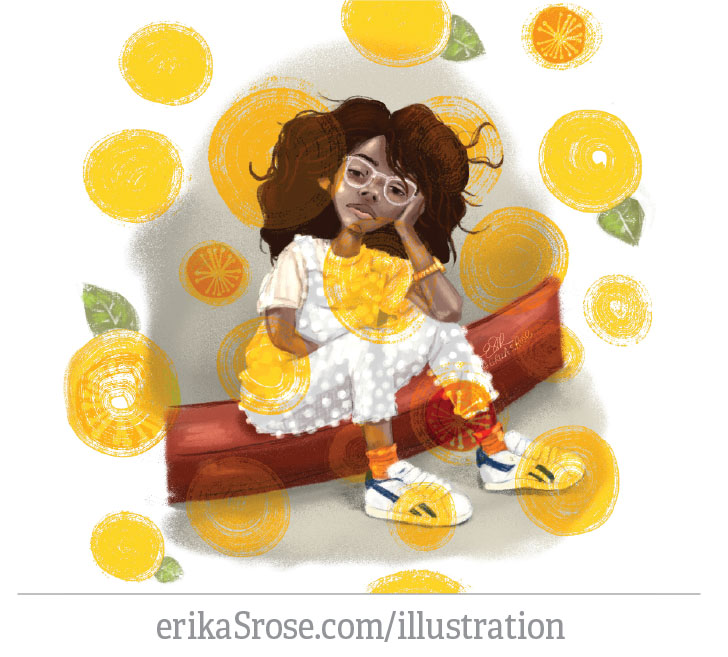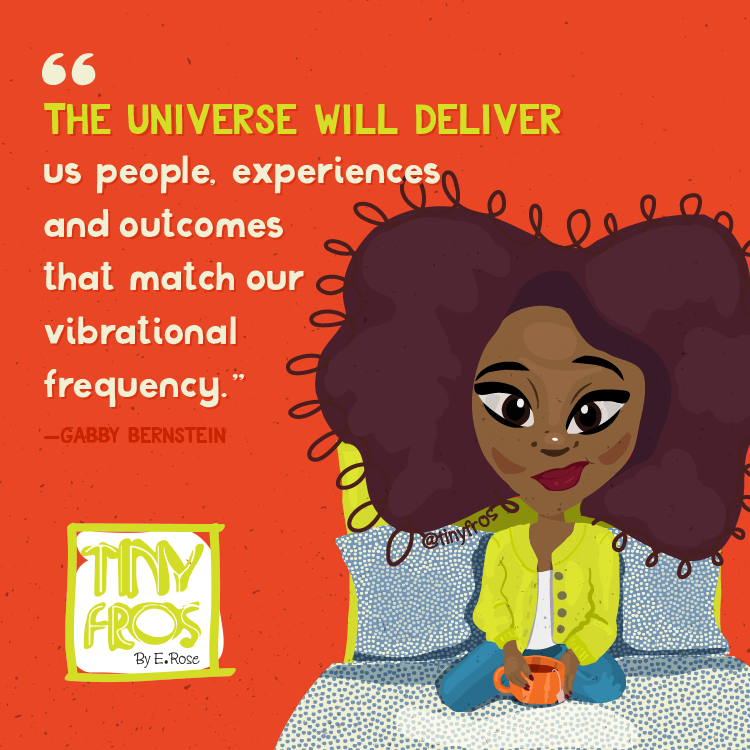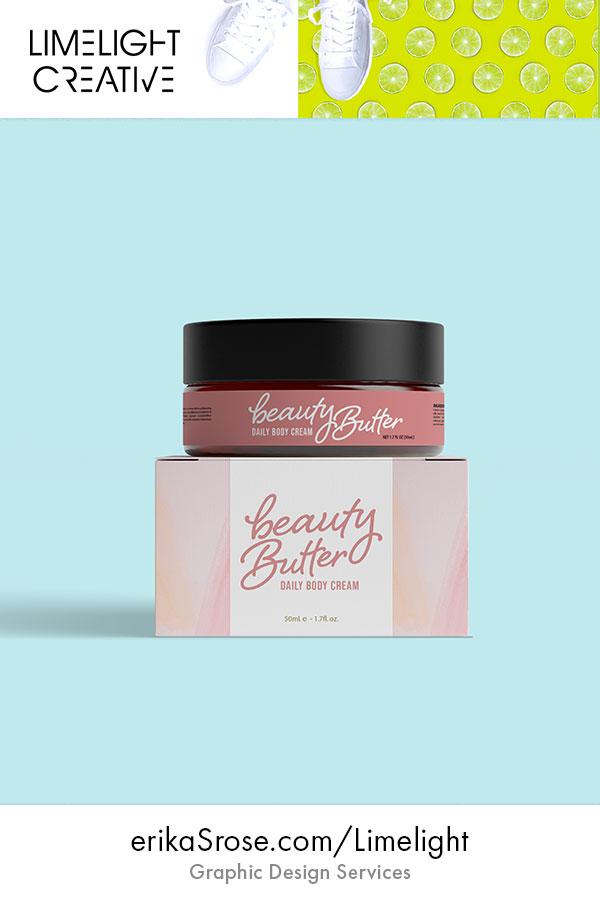Erika spent the majority of her youth in a hair salon owned and run by her mother in Richmond, VA. As anyone can imagine, growing up in a salon – the hairstyles, the conversations, the smells – leaves a lasting impression. One she could only put into words through the stories of her family and her journey so far. Continuing the entrepreneurial spirit, she is now living and working out of Los Angeles as an independent freelance graphic designer, with hopes of turning her small business into a self-sustaining company supporting the creative arts. We talked about her journey to working for herself, staying uplifted and some of the challenges she faces.
Erika Rose grew up in a hair salon where she watched her mom style women’s nails for nearly 20 years of her life. As the artist behind Tiny Fros, a series of colorful inspirational illustrations, I had to wonder whether the name paid tribute to her upbringing. She admitted maybe it did subconsciously. “Growing up around hair in a salon will always be a part of my life. And I’ve always been attracted to Black art that kind of was expressive when it comes to the hair and depicting everyday life.”
“My life always takes me back to hair. I’m in a space now where I think I want to design for hair brands. It’s kind of a 360 moment.”

If you haven’t already followed the Tiny Fros Instagram, you’re missing out. What began as a way to reconnect with her appreciation of cartoons grew into much more than what she ever expected. She says, “It started as a study…” She wanted to loosen up her hands and get back into cartooning. “It kind of developed into this persona.” She also loves inspirational quotes and at the time was posting a lot of them on social media. Eventually she had a light bulb moment where she asked herself, “What would happen if I started to parody these illustrations with inspirational quotes?” She started to develop a character who had expression, who was looking at you like ‘yeah I’m talking to you’. “Generally, I find quotes that would help me. For art that you’re creating it has to be self-serving to an extent. You do have to put something in you that you want to get out. But I also want it to benefit someone else. I do try to find quotes that if I read it, I would think twice about certain things.”
“I do it for myself and then I do it for the art.”

She’s received a range of feedback from simple comments of agreement to messages from followers in Nairobi sharing how much of an impact her post has made on their day. To be a source of motivation or inspiration for others must surely take something out of you. When you expend energy giving, how do you give back to yourself?
“I’m a planner. I write things down. I try to get as much information as I can about different topics. That keeps me motivated and keeps me moving in the right direction. And of course, if you have positive friends around you that’s always a plus.” She also looks to Pinterest, nature, and photography for more inspiration and to replenish herself creatively. “I do yoga and pilates [to] calm [her] mental space and [as] exercise.” She has also dabbled in an array of small creative ventures like crocheting and sewing and selling bow ties on Etsy. “It made me more aware of the fact I need to be the person that’s the business owner, maybe the creative director, versus actually creating those things. I think they’re all great, but I was more so attracted to the strategy of it all.” Rather than being a jack of all trades, she prefers to have awareness of her strengths and take a practical approach. I’m sure we can all relate to having the desire to do it all, learn it all, and be it all. But sometimes, you have to rely on others for support and look to the people whose strengths overlap your weaknesses. This is exactly where Erika finds herself now.
She’s taken advantage of small business association resources so that she can build more of her business. “I’m switching my mindset to I have to do it all to how can I plan so that I don’t have to do it all. I go to panel events [and] conferences to absorb as much information as I can. Because that’s the goal, I want to find a graphic designer and pay them to do it for me.” The confidence and tenacity comes through clearly. I was reminded of a quote by Michelle Obama that goes: “The only limit to the height of your achievements is the reach of your dreams and your willingness to work for them.” For someone with so much willingness and ambition, it’s easy to imagine burning out. I asked Erika Rose how she combats being overworked.
“I just have to take breaks. I’m very regimented when it comes to my schedule. I have a physical planner where I plan things out. I try to designate certain days for certain things, and it helps me manage the workload. So I know I need to be more free, more open on this day and then on this day I know I can handle business. I think that’s what helps me the most.” Ah, got it! Simple right? Not at all, it took practice and consistency over the past five years to really embed this habit into her lifestyle. It actually began around the time she was working full-time and going to grad school. “I hadn’t always been like that. I consider myself a very lazy artist…I didn’t really create a lot. I didn’t have a need for it. But when I stopped being lazy, when I picked up a pen or a pencil, I needed to figure out how to manage it all, so I wasn’t overworking myself. And then I was also in grad school so I had to. When you’re back in school you have to figure out a way to organize your life. I think over the past few years it has helped tremendously. And you get a sense of satisfaction when you can physically check something off your list.”
Practice does make perfect improvement. And at the end of the day, just being able to have tried and see yourself do better or learn is golden. As always, I wanted to know what advice Erika would give to others, but first, I wanted to know what she would say to herself. Here are the highlights:
Write down your accomplishments. “…If you were to ask me at the end of the year, what did I do? I wouldn’t be able to tell you. I think it’s been good practice to just write down the things I attempted. They may not have come to fruition but [even the] things I put effort into I can reflect on it, so I can say you actually did a lot this year, you accomplished a lot.”
Have a plan. “I would not suggest that anyone go into freelancing without a little bit of stability. It gives you a little bit of peace of mind so you can figure out what’s the next step. [That’s] just me and my very analytical brain. It’s rare for an artist to be both, but I have to because I gotta survive. I think that made it less scary. You still don’t know what tomorrow [is] gonna bring, anything can change. You just go with the flow. A lot of people take the leap and it works for them. [For] some people it doesn’t. It really is a gamble.”
Take a step back. “[Take logo design, some people] rush to that without thinking of the target audience or the product behind it, or what you’re trying to communicate. I think it’s best to take a step back and think about what the end game should be. What do I want it to be? How do I structure this so that I can be successful? Then talk to people. Talk to people who are in business, find out what it is you need to do to set yourself for marketing, etc. ”
Advice level: solid.
CHECK OUT MORE INSPIRATIONAL WORKS BY E. ROSE:


Leave a Reply